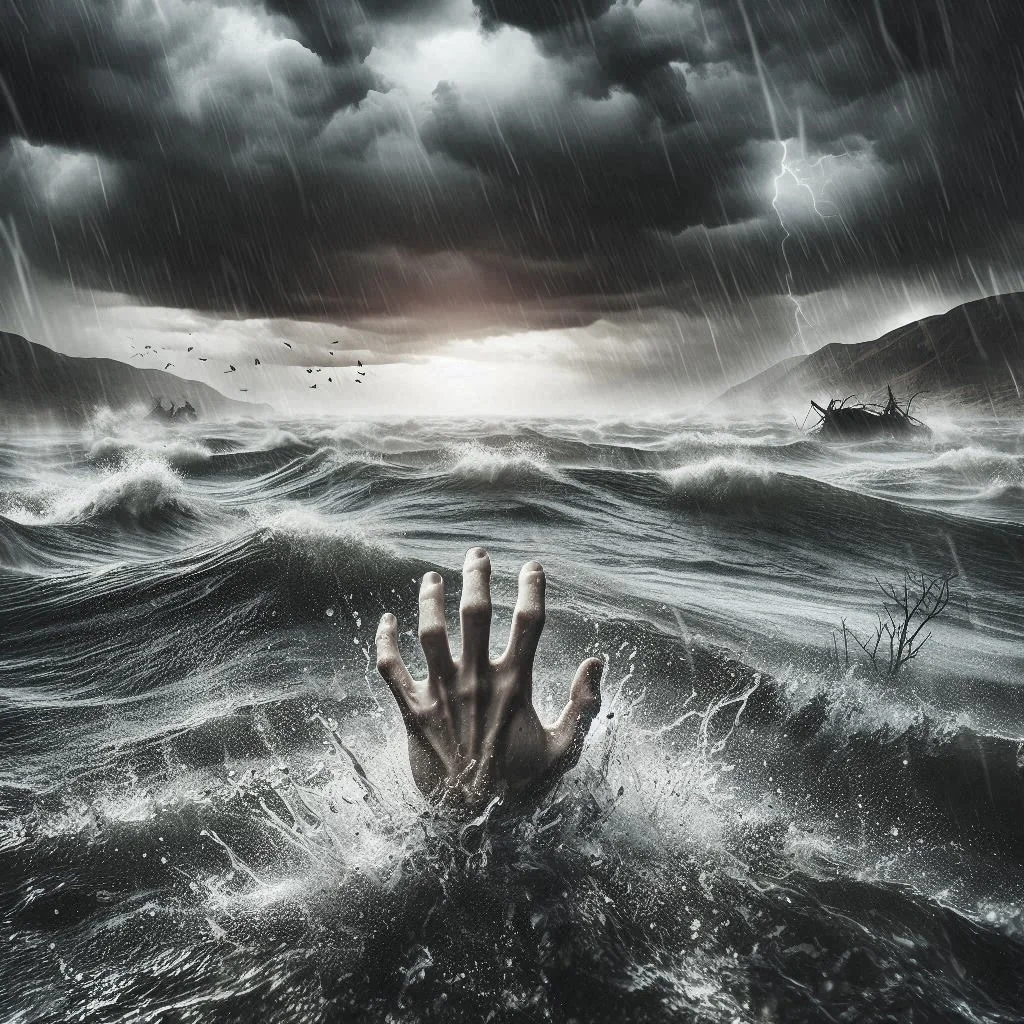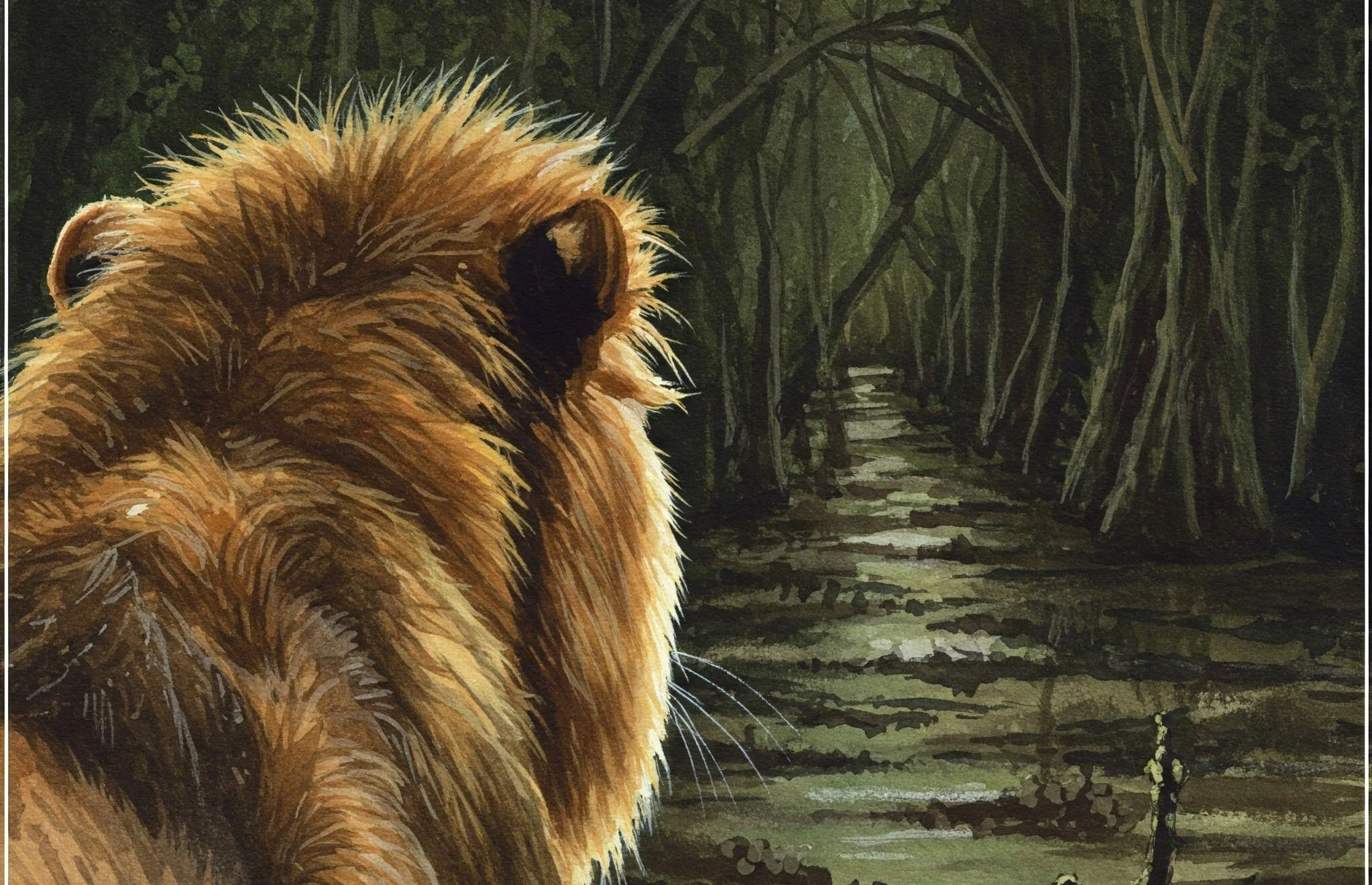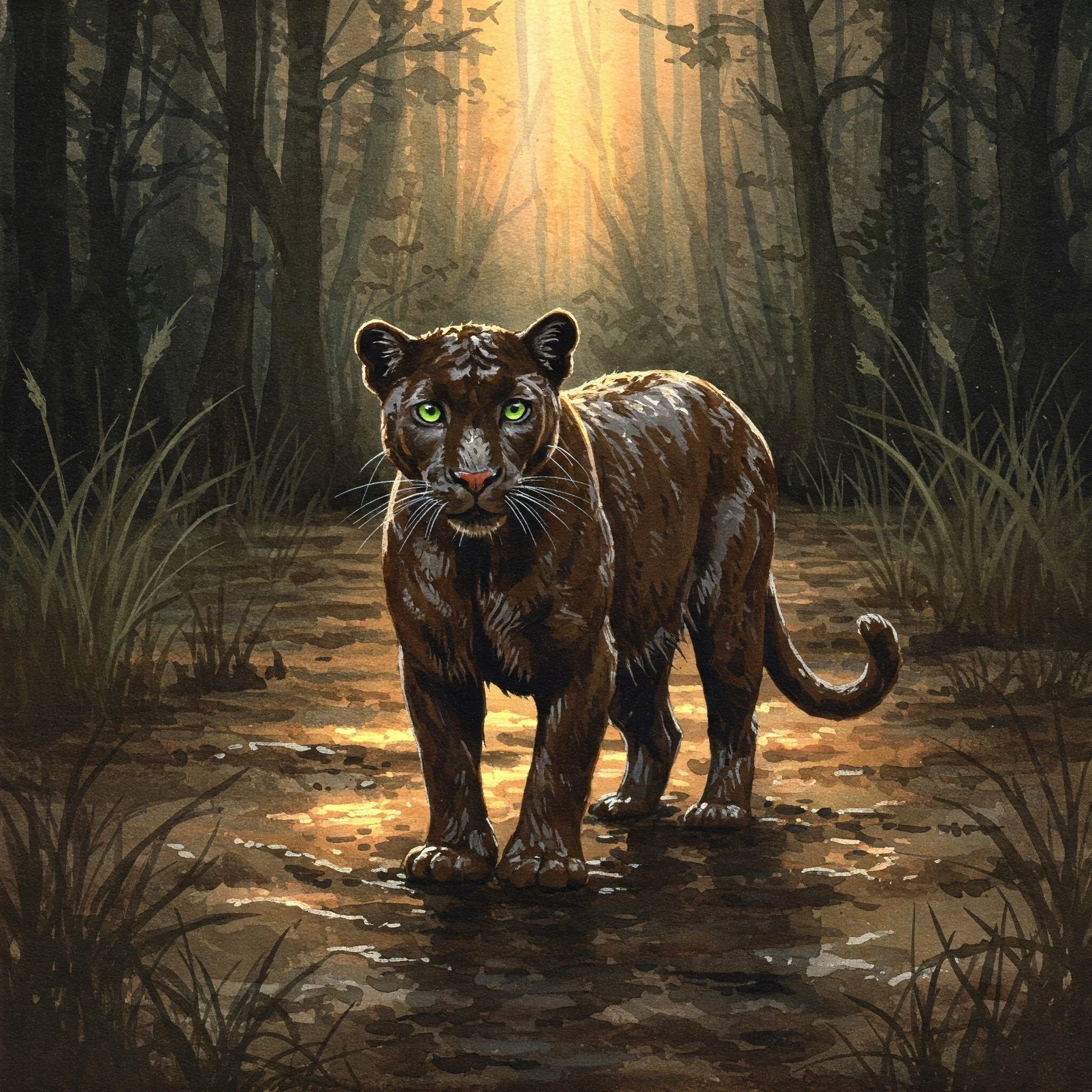HERE, THERE, and EVERYWHERE (Kittens Beware)
When someone is deeply mired in despair, they cannot be rescued—no matter how much you love them or how hard you try. But their loneliness can sometimes be alleviated by walking alongside them, even briefly, by truly listening, sitting quietly, or easing the tension with a touch of humor.
Still, you can’t carry someone else through the swamp. It is their journey to make. All you can do is accompany them for a while, then let go.
When you find yourself in the darkest part of the swamp, do you crave companionship? Why or why not?
At the most difficult times in my life I actually preferred to be alone in my misery, not wanting to deal with well-meaning, but futile gestures. For instance, sometimes my Parkinson’s symptoms are unpredictable and painful spasms interrupt my world, no matter how faithfully I follow my medication, exercise and diet regimes.
Once I was deeply mired in a stormy swampy current, glad I was alone, not having to deal with any faces around me that reflected their own helpless reactions when my body rebelled. I felt so beaten down and overcome by swampy storms, I was sure there was no way to combat forces beyond my control and simply did not want to be responsible for anyone else’s rescue.
This time I was drowning. Seriously drowning in a relentless, slimy torrent that poured out of me, through me, and all around me. That snotty stream overwhelmed the walls I had carefully built, the flimsy dams I had crafted to hold back the flood of pain. How naive I
had been, thinking I could engineer an emotional safety net—a reserve of resilience to contain what was bound to overflow. I frantically piled up makeshift “sandbags” of empty compliments I had always hidden behind, pretending to be humble. I threw out desperate words like “faithful” and “courageous” and “inspiring,” but they were laughable, quickly swallowed by the surge. My sobs ran so deep that I couldn’t catch my breath, my diaphragm trapped in a tight, unyielding vise.
Then, just for a moment, there was a lull—a strange calm, like the eye of a hurricane. But it was brief. My nervous system rallied, launching a fresh assault as Parkinson’s dystonia overtook me, twisting my right side into rigid spasms, an agonizing “Weird Barbie” pose. My leg and arm contorted into painful angles; the harder I tried to resist, the worse it became. I was caught in an absurd trap, the cruelest paradox: I was fighting for my life, yet I was supposed to let go and relax.
In that swampiest of moments, a truth broke through: I had been lying about the beauty of this swamp. I had sold myself on visions of sunrise sweetness and kitten-soft comforts, but I had been fooling myself. I HATED that swamp.
As the muddy waters rose over my head, fury surged up in me. I thrashed my way to the surface and grabbed onto a branch with my left hand. Pain fired through me, but I dug in, hoisting myself just far enough onto the bank so my face rested on top of the mud. I inched forward, rolling and dragging my contorted limbs. If I could get onto all fours, sometimes I could loosen the spasms. Bit by bit, it worked, and I felt the sobs easing. I stood, even as storm winds whipped around me, trying to push me back to the ground. Ahead, I saw the outline of a dark forest and a pair of glowing green eyes. Those familiar, unblinking cat eyes. I had to reach them.
sometimes I could loosen the spasms. Bit by bit, it worked, and I felt the sobs easing. I stood, even as storm winds whipped around me, trying to push me back to the ground. Ahead, I saw the outline of a dark forest and a pair of glowing green eyes. Those familiar, unblinking cat eyes. I had to reach them.
With every ounce of strength, I limped forward, my rage bubbling over. “FUCK YOU, HERE!” I screamed, the words torn from me like shrapnel. No kitten could
have soothed me then; if one had dared to show up, I would have kicked it. dared to show up, I would have kicked it.
The eyes stayed fixed on me, but over the howling wind and pounding rain, I heard a a distant, answering roar—something that echoed my fury. My body pulsed with exhaustion; every step had drained my last bit of will. I collapsed to the ground, curling into a ball. Cold seeped into me as the rain slowed to a soft, steady patter. I closed my eyes, exhausted. Something warm pressed against me—a solid presence, not a kitten but something much larger. I leaned into it, too drained to care what it was, just letting the shelter of its body and warmth soak into my frozen muscles. I drifted into sleep.
I didn’t dream. Instead, I remembered:
Have you ever had the experience of not being sure if you are sleeping or not? Are your memories actually dreams? Are your dreams actually memories?
The sister-in-law looked at the hospital chaplain with piercing, mocking eyes. From the moment we met, she seemed to push me away while daring me to come closer. The nurse had asked me to visit this room—not for the unconscious patient, but for the woman standing vigil beside her.
The nurse had explained that the patient had arrived at the hospital in severe pain. The family was told she was actively dying and needed to stay to manage her suffering. The IV medication had finally made her comfortable, and her husband had gone home to shower and check on their two young daughters while she slept. His brother’s wife was the one who had stayed in the room.
“The sister-in-law is very devoted, which is lovely, but there’s something about her,” the nurse had said. “I can’t put my finger on it. She sits close to the bed, but at an angle facing the door. It’s as if she’s tethered to the room yet ready to flee at any moment. I haven’t been able to really connect with her, and that’s fine…I just feel like… there’s something there I’m missing.”
I knocked softly as I entered, introduced myself, and asked if I could visit. The sister-in-law nodded, her eyes cold. She was sitting just as the nurse had described. I pulled up a chair and asked about the patient. She repeated what the nurse had told me, then spoke about the trauma the family had endured: a cancer discovered too late and treatments that promised much but delivered nothing.
Then her voice shifted. Bitterness seeped in as she described how the patient had two young daughters, roughly the same age she had been when her own mother died of cancer. Was this the “something” the nurse had sensed? Hospitals often compel people to revisit past grief. Haunting memories surface, flooding the present moment with echoes of old heartache.
It was as if the skies opened, and her story poured out. She described her mother’s death in tortured detail, but her tone was detached, almost clinical. Her grief seemed as much a part of her as her arm or leg. The resemblance between the patient’s situation and her own traumatic childhood was uncanny. A subtle anger undercut her words as she oscillated between describing the patient’s daughters and reliving her own loss.
She spoke of a life of milestones that should have been joyful but were always tinged with sorrow. Her yearning for her mother colored every moment. I didn’t interrupt or try to steer the conversation. Instead, I nodded and murmured encouragement: “Wow…” or “I can’t imagine…” My role was simply to bear witness as she untangled the connections herself.
Her voice finally cracked when she vowed to be there for her nieces. She wanted to offer them what she never had: someone who truly understood their pain.
The loneliness she expressed was palpable. The chasm between us felt like a canyon with no simple bridge. Occasionally, as she spoke, flashes of my own mother’s death crossed my mind, even though our stories were worlds apart. (I had been an adult with my own three little girls when my mother died.)
I grasped at my inadequate chaplain lifeline: I asked if she’d like me to pray. She nodded indifferently. I confirmed the patient’s Catholic faith and, noticing the sister-in-law’s cross necklace, asked if she shared that faith. She absently reached up to touch the cross at her throat and shrugged.
“I don’t know what I am. Just go ahead and pray whatever you want,” she said, looking at the patient’s closed eyes.
I joined her and turned to the patient—so alive, yet so far away. The air in the room felt heavy, thick with the presence of deeply missed faces. Was it simply the nurse who had directed me here? Or had the sister-in-law’s mother, or mine, or some other force brought us together? It felt like we were part of a tableau of grieving mothers and daughters, woven into the fabric of human existence.
I took a deep breath, closed my eyes, and said simply, “Dear God, this sucks.”
She gasped softly. After a pause, I continued, “There aren’t words for our pain. So all we can do is pray the words given to us by the Church: ‘Our Father, Who art in heaven…”
Her phone buzzed, but she ignored it as I finished the familiar prayer. When I opened my eyes, she was wiping tears from her face. The phone had stopped ringing.
We sat in silence for a few moments before the spell broke. In that stillness, the paradox of the moment became clear: though we shared a sacred connection in our grief, I could never fully understand her pain, just as she could never truly shield her nieces from the heartache awaiting them. Each of us must navigate our own story, charting a path through sorrow that no one else can fully walk with us. All of humanity is inextricably bound together while simultaneously being profoundly alone.
Finally, she collected herself. “I need to call him back. Thank you for coming,” she said, turning away to dial.
The next day, I returned to find her in the room with the patient’s husband. The sister-in-law hadn’t changed her clothes, indicating she had never left. Now, she stood with the husband, both of them witnessing the breathing changes that signaled the end of life was near. I asked if they wanted me to pray.
“Yes, please,” the sister-in-law responded quickly, lightly touching the husband’s arm. “The same prayer you said yesterday.”
So, I began again, “Dear God, this sucks…”
The next time I saw the two of them, later that day, when I was on my way to the emergency room. They were further down the hall, stepping into the elevator, carrying the clear plastic bag the hospital used for the patient’s belongings, along with the vase of flowers that had been at her bedside. I reached the elevator opening but didn’t push my way into the crowded compartment. Our eyes met in recognition of their final walk out of the hospital. She held my gaze and whispered, “Thank you.” as the cold steel doors swished shut.
This story became one I often shared with clergy friends during their moments of deep personal despair. Their anger and loneliness often threatened to peek out from beneath their vestments. They felt unable to let their congregations see their struggles with questioning divine will or their anger at the arbitrary injustices of life. They always smiled, however, when I shared the opening phrase of my prayer, and then repeated it, relishing its irreverence: “Dear God, this sucks.”
I had no idea how much time had passed when I awoke and opened my eyes. The rain had stopped, though the air still spit at me through the lingering mist. My gaze fell on the golden fur beside me, the soft solid form that had sheltered me. My fingers brushed over it, feeling the sinewy strength beneath the lion’s skin. I reached up to the dense mane, my fingers disappearing into its coarse, shadowed thicket, thick as ancient roots.
Sitting up, I took in the lion’s form and followed its gaze into the trees. Through the fog, I spotted a well-worn path leading back home. But did I really want to take it? What was the point? Returning would mean facing the same soggy scene.
I reached for my swamp backpack, which I always seemed to have with me. Digging through scraps of paper with inspirational quotes meant for moments like this, I finally found what I was looking for—a crinkled, half-eaten bag of peanut M&Ms. Triumphantly, I popped one into my mouth, savoring the contrast of the melting shell and chocolate before crushing the peanut.
The lion yawned, unimpressed. I sighed, pulling out my swamp map. Spreading it on the ground, I traced the familiar path, clearly marked but uninspiring. I felt the futility of it all—this cruel quest for “home.” The map, with its detailed drawings and labels, seemed like nothing more than a childish collection of scribbles. Safety, comfort, and “happily ever after” were fairy tales.
A loud “SPLAT” jolted me from my thoughts. Mud splattered across the map. I looked up to see the lion slapping a puddle, its golden fur now speckled with mud, transforming it into a spotted “mud cheetah.” Laughter escaped me. Tossing the map aside, I joined in, jumping and slapping the mud. Our silly, slapping war dance became a parody of Singing in the Rain.
We rolled and wriggled in the muck, roaring with laughter until we lay breathless, side by side, not quite touching. My body felt alive, my limbs loose. The path I had identified earlier no longer tempted me. Picking up the mud-streaked map, I wiped it clean, though it hardly mattered. The answers weren’t written there.
For the first time, I looked around with fresh eyes. The fog still hung heavy, but in the distance, I saw an old dock. As I approached, I noticed a leaky wooden boat tied to it. It wasn’t time for random rowing, I decided. Then I realized the dock stretched further into the mist.
The air seemed clearer ahead, but the structure looked fragile, its planks groaning under the weight of uncertainty. Could I trust it to hold me? I turned to find the mud spattered cougar/lion, but it was gone. Disappointment rose until I spotted familiar green eyes glowing through the mist. The big cat, now completely covered in the camouflaging muck, appeared in the sleek visage of a panther. Silent and watchful, it seemed to urge me forward.
I slung my pack over my shoulder and stepped onto the creaking boards. Each movement felt deliberate, the moment heavy with meaning. When I turned back, the panther’s glowing eyes met mine, warm as embers.
“I’m okay,” I whispered, a mix of gratitude and farewell in my voice. The panther held my gaze a moment longer before slipping into the shadows.
What is the difference between the three forms of the Big Cat? Does the lion, the cheetah or the panther resonate more or less in your swampy experiences? Do you find one easier than the others to personify when supporting others?
Alone on the fragile span, I realized it wasn’t a dock—it was a bridge. Suspended between two worlds, I stood in the first rays of dawn, the weight of possibility settling over me.
And then, the sunrise.
Crimson and gold spilled over the horizon, transforming everything in its wake. The world glowed, alive with radiant change. I laughed softly, remembering how I always declared the sunrise before me to be “the best one ever.”
This time, I wasn’t lying. Each dawn was unique, a fleeting masterpiece. I wondered why, when lost in the swamp, I could never trust this moment would come. Perhaps it was because no two sunrises were the same. They weren’t snapshots I could pull from my backpack—they were living, breathing experiences.
That was the gift of the swamp. Each dawn reminded me of the courage it took to endure, to trust the unseen. It was a gift shared by those who met me there, who understood the quiet, transformative power of simply being present.










